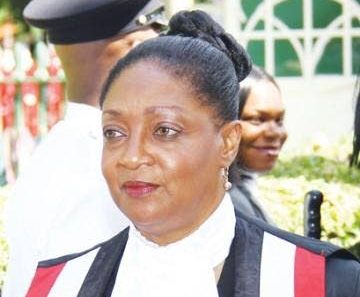Appeal Court to rule on UNC Lengua/Indian Walk election petition on March 26

IN less than a month, electors in the local government district of Lengua/Indian Walk will know for certain if they are to return to the polls.
On March 26, Justices of Appeal Charmaine Pemberton, Vasheist Kokaram and Carla Brown-Antoine will rule on the United National Congress’s (UNC) appeal of its election petition.
In January, Justice Marissa Robertson dismissed the election petition. She ruled the EBC acted correctly in rejecting a disputed special ballot because it did not have the returning officer’s initial, as required by the election rules.
The UNC filed the petition on August 21, 2023, after two recounts led to the PNM’s candidate Autly Granthume being announced the winner over the UNC’s Nicole Gopaul-Jones on election night, August 14, 2023.
Granthume initially received 1,430 votes compared to Gopaul-Jones’s 1,425. At the end of the first recount, each candidate received 1,428 votes.
However, the returning officer rejected a special ballot in favour of Gopaul-Jones – which would have broken the tie.
Gopaul-Jones challenged the rejection of the ballot, insisting it was valid and ought to have been counted, which would have led to her being returned as the councillor for the district.
The EBC maintained its reasoning for rejecting the ballot as required by election rules under the Representation of the People Act.
The EBC declared a fresh election for the district after the returning officer declared the election void.
As with all election petitions, if the petitioner is unsatisfied with the High Court’s decision, it can appeal only to the Court of Appeal, as the Privy Council has no jurisdiction over such electoral litigation.
On Tuesday, attorney Anand Ramlogan, SC, who represents the petitioner, urged the Appeal Court judges to be circumspect and cautious when scrutinising the election rules as an election court.
“Any ground that leads to the disenfranchisement of voters has to be strictly and narrowly construed.”
He said election law recognised there would be irregularities.
“But not every irregularity can lead to a disqualification of a ballot.
“Election rules are important. But does it lead to automatic disqualification of the ballot? No. A breach of an election rule doesn't lead to automatic disqualification of a ballot unless the law expressly provides for it,” Ramlogan argued.
He said the local election rules did not provide for disqualification for the absence of an official mark, signature or initials. He pointed to election rules in the United Kingdom which catered for such circumstances, saying the rules must expressly provide for it, as in the UK.
Ramlogan insisted the election rules provided a “curative procedure” for a returning officer to treat with a special ballot which did not have the initials of the returning officer for the special polling station.
“The court has to look at the statute (the Representation of the People Act) and look at the rights of the elector and enfranchisement of the voter.
“There is clear deliberate policy judgment by the Parliament, which chooses to word it in a particular way.
“Parliament has set out the grounds to reject a ballot. There is no ground that the failure of an initial ballot is to be rejected. In the absence of a ground to invalidate or disqualify a ballot, it must be counted.
“A clear provision is required…It is a rights-based approach to jurisprudence aimed at enfranchising the voter,” Ramlogan said.
He also called on the court to “comment” on the conduct of the EBC in correspondence with the UNC in the disputed ballot.
However, the EBC’s lead attorney Deborah Peake, SC, said it would be “absurd” to ignore the breach of the election rules and treat the disputed ballot as valid, as contended by Ramlogan.
“It would be an absurd result no matter what interpretation you apply.”
She also contended there was no curative power.
“It would be improper for the court to intervene even if it thinks there should be a curative power."
As she took the judges through the evidence, Peake said the UNC had an election agent present when the special voting ballot boxes were opened on August 14, 2023, and there was no objection to the specific ballot being rejected until after the recount, when the UNC realised the vote was in favour of its candidate.
She also said the EBC could not be faulted for how it dealt with the issue, nor did anything the commission do caused any prejudice to the petitioner.
“They didn't suffer prejudice. There was no evidence of bad faith, a duty of candour or misleading the petitioner.”
She also said the election rules, which are made by the President and not the Parliament, were clear.
“If the rules say you must reject the ballot because there are no initials, then the ballot must be rejected.
What is the importance of the initials? You can't cast your vote as a special ballot unless it has the initials of the returning officer. A special ballot is special because it is out there for days…So there are safeguards in the rules.
“It was rejected at the preliminary stage. You (the special voter) should not have been permitted to vote (because the returning officer’s initial was not on the ballot) but if you did vote, the vote cannot be counted.
“You do not disenfranchise the voter if the language is clear…The safeguard is the initial.
“The court has to say the vote was properly rejected on the rules. We have to apply the rules to protect the integrity of the democratic electoral process.”
Also representing the UNC were Kent Samlal, Natasha Bisram, Vishaal Siewsaran and Saddam Hosein. The EBC was also represented by Ravi Heffes-Doon and Alana Bissessar, while the PNM’s candidate was represented by Michael Quamina, SC.

Comments
"Appeal Court to rule on UNC Lengua/Indian Walk election petition on March 26"